The Penn State Extension Master Gardener volunteer program supports the outreach mission of Penn State Extension by utilizing unbiased research-based information to educate the public and our communities on best practices in sustainable horticulture and environmental stewardship.
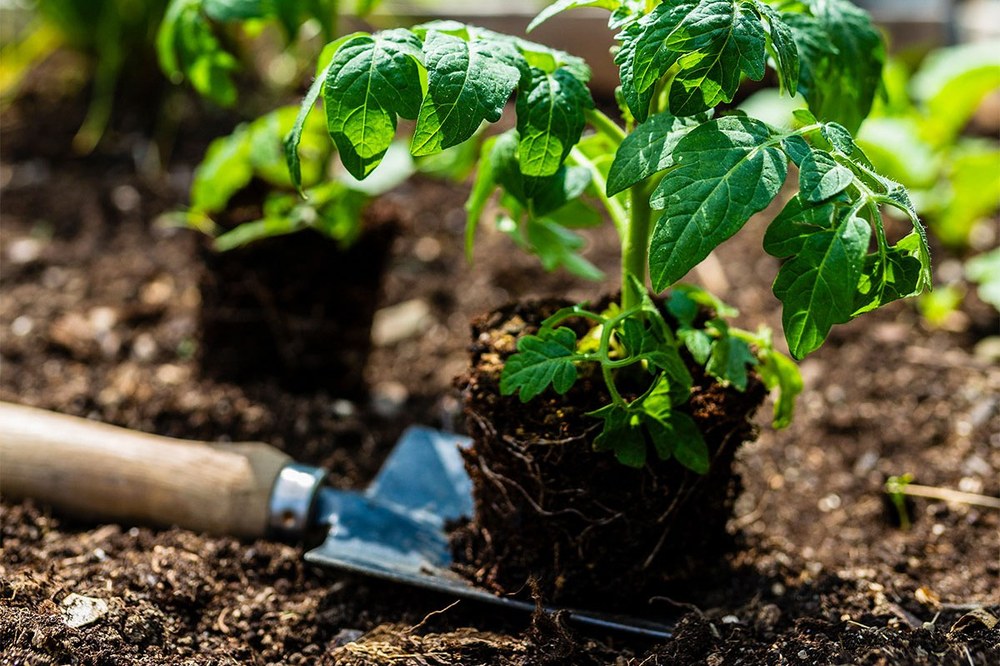
Photo credit: Adobe Stock
Greetings from the Penn State Extension Master Gardener Program!
As you will see in the pages of this annual report, 2023 was an incredible year for our program. We had 3,688 active volunteers who contributed 220,211 volunteer hours, equivalent to $6.56 million*. While this total number of hours is still slightly below our pre-pandemic record, our impacts reached new heights this year. Whether you are reading this report as a county commissioner, a newly trained Master Gardener, or a client who contacted your local Garden Hotline for the first time last month, thank you for supporting our program. Thank you for engaging in research-based education for sustainable horticulture and environmental stewardship. And most importantly, thank you for caring and seeking to improve your local community.
Erin Kinley
State Master Gardener Coordinator
Statewide Highlights
Enrollment
- 3,688 active volunteers, including 471 trainees
- 220,211 volunteer hours reported for a value of $6.56 million
Public Outreach and Education
- 1,678 presentations for the public
- 688 articles written and published
- 679 educational displays and booths at public events
- 270 educational demonstration gardens
- 447 news articles, radio spots, TV interviews, and podcast episodes featuring Master Gardeners and their projects
- 81,231 social media followers and members
Partnerships
Master Gardeners provided educational programming and support at:
- 147 community gardens
- 260 K–12 schools
- 68 youth camps
- 155 libraries
- 552 community organizations
Spotted Lanternfly
Public education about this invasive pest was given through:
- 126 presentations and webinars for the public
- 648 outreach displays
Donations
Master Gardener county programs donated:
- 28,204 pounds of produce to local food banks and other non-profit organizations
- 19,693 seed packets and 11,581 plants to other organizations, community groups, and the public
Basic Training Hits Enrollment Record
The 2023 Basic Training class had record-high enrollment with 618 trainees, 74% of whom completed their full certification. From the training evaluation results, the percentage of trainees who felt "very confident" answering questions across all topic categories increased from 5.3% before the training to 36.98% after the training. By the end of the training, 100% of trainees reported that they would change or adopt a new gardening practice. Master Gardener trainees show significant learning and even demonstrate direct improvements to their gardening practices during the training. In the 2023 evaluations, most trainees (67.8%) responded that they learned "a great deal." In addition, 9.2% had already reduced pesticide use, and 7.1% had reduced fertilizer use by the end of class.
"I now have a much-improved knowledge base to plant native plants that will help me become a better custodian of the environment."—2023 trainee
"I like that the classes are not just direct lectures on what is learned in the book but rather an extension of the information and how to use it practically."—2023 trainee
"The instructors were great, the guest speakers were great, I learned so much, and [I] am so thankful and excited to become a Master Gardener!"—2023 trainee
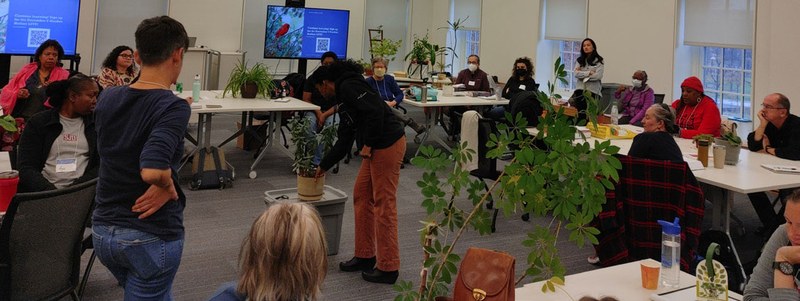
Philadelphia Master Gardener coordinator Jessica Schweiger guides a Master Gardener trainee through diagnosing a houseplant as part of a Basic Training hands-on workshop. Photo Credit: Erin Kinley
Penn State Master Gardeners Shine on the Global Stage: A Triumph in Pollinator Research
In a resounding affirmation of their commitment to excellence, the Penn State Extension Master Gardener Program took center stage at the 2023 International Master Gardener Conference in Overland Park, Kansas. The event was hosted by the Kansas State University Extension Master Gardeners of Johnson County. This prestigious gathering attracted 1,130 extension Master Gardeners and professionals from 44 US states, Canada, and England.
The pinnacle of their success came from the David Gibby International Search for Excellence Awards, named after the visionary founder of the extension Master Gardener Program. Penn State Master Gardeners clinched the top spot in the research (Applied Scientific Methodology) category. This accolade was a testament to the collaborative efforts of 20 dedicated Master Gardeners and the López-Uribe Lab from the Penn State Department of Entomology.
In a groundbreaking initiative, they focused on deepening our understanding of Pennsylvania’s native bee population, significantly contributing to pollinator research. This community science project demonstrates the Master Gardeners’ unwavering commitment to environmental stewardship. It also serves as a beacon for advanced training in the meticulous processes of collecting, pinning, labeling, and identifying native bees.
This triumph underscores the Master Gardeners’ broader dedication to advancing horticultural knowledge and fostering community engagement. They are a formidable force of 3,688 volunteers who support extension’s educational programs. They also play an indispensable role in enriching the experience of home gardeners. Through expert advice, captivating demonstrations, and impactful projects, the Master Gardeners contribute to local communities and the global dialogue on sustainable gardening practices.
This recognition at the international conference stands as a proud testament to their tireless efforts and the enduring impact of their contributions in horticulture and environmental education.
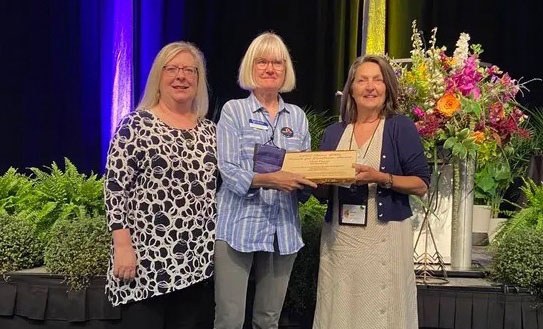
Pictured: Valerie Sesler, Stephanie Szakal, and Susan Janton. Photo credit: Andy Faust
Poison Prevention Program
The Penn State Extension Master Gardeners collaborated with extension's Pesticide Education Program to deliver poison prevention education to first grade students across the commonwealth. In spring 2023, the program educated 18,087 students in 280 schools and in 48 counties across the state! The 30-minute lesson teaches students about pests, integrated pest management, and poison safety, including identifying signal words such as "danger," "warning," and "caution" on product labels for potential toxicity. Master Gardeners emphasize the importance of using the "Mr. Yuk" symbol to alert everyone in the home about dangerous products and to promote overall safety. Each lesson includes a packet for students to take home and share with their families. These packets contain Mr. Yuk stickers that adults can place on products displaying the signal words learned in the lesson. The packets are offered in English and Spanish.
After the program, participants were sent surveys to assess success. Over 98% of survey respondents were satisfied or extremely satisfied with the program, and over 91% were interested in more horticultural education from the Master Gardeners.
"The Master Gardeners did a great job sharing information with the first-grade students at Ben Franklin Elementary School. I just completed a unit on insects, so the students were familiar with a lot of the material. The students benefitted from the expertise of the volunteers who shared the information with my class. Thank you!"—A first grade teacher
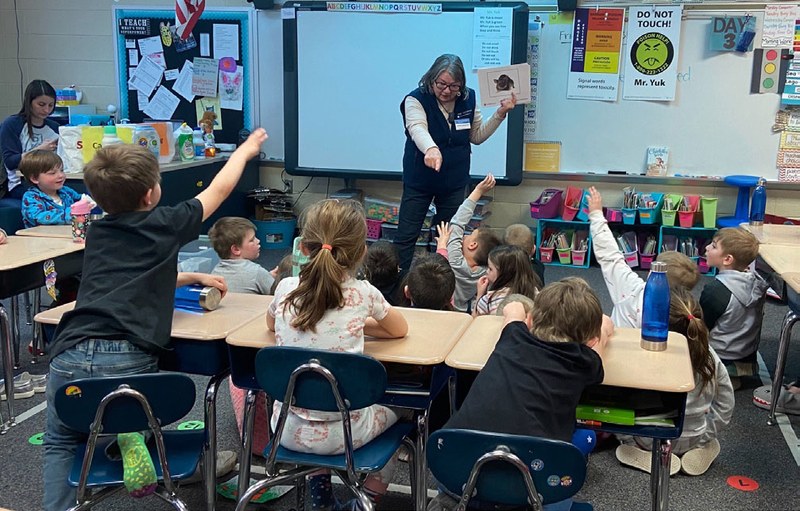 Photo credit: Andy Faust
Photo credit: Andy Faust
Growing Seed to Supper
| The Seed to Supper Program helped me: | % of participants who agreed or strongly agreed |
|---|---|
| Grow my own food. | 99% |
| Increase garden knowledge. | 98% |
| Eat more vegetables. | 81% |
| Try new varieties of vegetables. | 87% |
| Connect with others in my community. | 91% |
| Learn more about resources available to me with my community. | 90% |
Survey results from 2023 Seed to Supper participants.
Hunger continues to be a growing crisis in every county in Pennsylvania. We have seen prices for groceries double or triple in the past 2 years. For nearly 1.7 million Pennsylvanians, food insecurity is a daily part of life. Hunger is a symptom of the greater issue of poverty and a far too prevalent condition that touches urban and rural areas of the commonwealth. It particularly affects families, children, older adults, and people with disabilities. To battle hunger in Pennsylvania, it will take a commitment from the private, public, and nonprofit sectors to ensure the availability of an all-inclusive array of interventions and supports to lift low-income families out of poverty.
Seed to Supper strives to be one of those interventions. It is geared to support adults and families who are food insecure at no cost or at extremely low cost. By teaching new gardeners how to successfully grow a portion of their food, we are empowering them to take control of their access to fresh, healthy, nutritious foods. The Penn State Extension Master Gardeners may also partner with Penn State Extension's Food, Families, and Health team, chefs, nutritionists, or culinary institutes. Together they impart knowledge on nutrition, food literacy, preservation, and cooking skills to develop an all-encompassing series of classes to enhance the quality of life for those in need.
Master Gardeners offered the Seed to Supper program in over 20 counties in 2023 and received outstanding reviews from participants. Want to have a Seed to Supper program in your county? Contact your local extension Master Gardener Program and request this all-encompassing program!
"The handbook is amazing! Our Master Gardeners were wonderful! They were so helpful, friendly, and knowledgeable. It was a wonderful experience." —2023 Seed to Supper participant
"The Seed to Supper class has built my confidence to get out there and grow my own food, a missing piece in my life. Gratitude!!"—2023 Seed to Supper participant
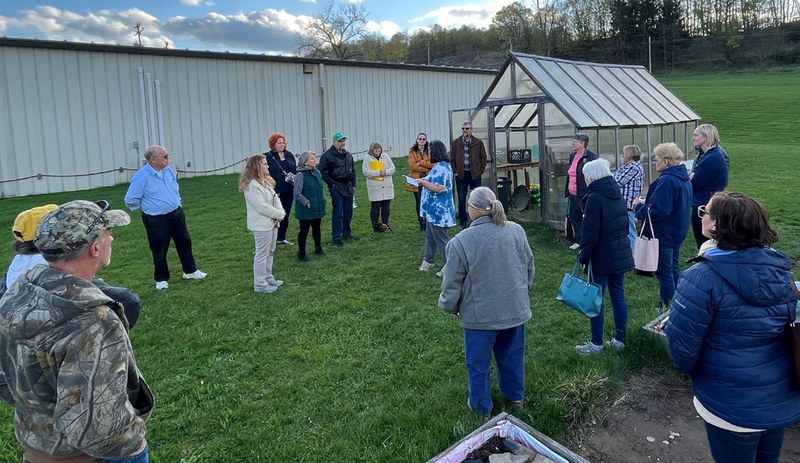 Photo credit: Howard Burkett
Photo credit: Howard Burkett
Growing Healthy Hearts: Master Gardeners Collaborate with the Penn State College of Medicine
The Penn State Extension Master Gardeners celebrated a second successful year of collaboration with the "Growing Healthy Hearts" program. This important study aims to improve cardiovascular health through online gardening education and nutrition intervention. The program is championed by Dr. Susan Veldheer, a faculty member in the Department of Family and Community Medicine at the Penn State College of Medicine.
The 20 Growing Healthy Hearts study participants receive confidence-building gardening advice from the Master Gardeners—like how to grow their own healthy fruits and vegetables. They also receive social enrichment and support via a closed Facebook page. Participants are equipped with nutritional education on the DASH diet and taught basic cooking skills. They wear a FitBit smartwatch to monitor physical activity and undergo rigorous diet assessments. For a measurable comparison, another group of 20 serves as a control group and receives none of these interventions. At the conclusion of the randomized trial, Veldheer will show the extent to which this program influenced participants’ diet and activity levels. In other words, can a learned love of gardening and nutrition translate into healthier lifestyle practices and better health outcomes? We look forward to sharing the study results when they are published!
Garden Hotline Reaches New Heights
This year, the Penn State Extension Master Gardeners answered 29,251 questions from the public, which is a 36% increase from 2022. The Garden Hotline continues to successfully respond to questions that would otherwise need to be addressed by University and extension faculty and staff. In 2023, Master Gardeners volunteered just over 19,000 hours on Garden Hotline, valued at $565,000*. Furthermore, of the total disease and insect questions received from the public, less than 7% and 5%, respectively, were sent to the University for further evaluation. In a time of peak inflation, fewer faculty appointments, and shrinking University budgets, this contribution is critical for providing the public with high-quality, time-sensitive responses to plant health questions.
In a web survey of Garden Hotline clients, over 80%** said that the advice they received helped them save money. Of that number, 27.8% said they avoided purchasing the wrong pest management strategy, 19.6% said they saved a sick plant that is now doing better, and 10.3% said they used a lower-cost cultural or mechanical method to manage a pest.
*Value calculated using the 2023 Value of Volunteer Time Report by the Independent Sector, which estimates that an hour of volunteer time in Pennsylvania was worth $29.78 in 2022.
**72 out of the 89 individuals who responded "Yes" or "No" to the question, "Did the advice help you to save money?"
"I am so grateful to the Master Gardener for answering my questions and making it easy to understand the steps I needed to take to try and save my tree!"—2023 survey response
"I’m pleased I reached out to them and got such amazing help and guidance. Excellent resource in terms of information and the Master Gardener who answered my questions and emails was very kind, informative and always got back to me in a timely fashion."—2023 survey response
Table. Questions Answered by Category
| Category | Number |
|---|---|
| Spotted Lanternfly | 1535 |
| Referrals, Upcoming Events and General Program Info | 2083 |
| Insect (Indoor and Outdoor) Samples Sent to Penn State for ID | 90 |
| Insect (Indoor and Outdoor) Questions or Samples Processed at the Office | 1833 |
| Wildlife and Animals | 1403 |
| Weed and Invasive ID and Management | 2345 |
| Soil Health (Soil Testing, Composting, Mulching) | 2567 |
| Site, Weather-related, or Cultural Problem | 1713 |
| Plant ID | 3452 |
| Plant Culture, Care, and Pruning (Includes Turfgrass) 5006 | 5006 |
| Garden Planning, Plan Selection, Plant Propagation | 4258 |
| Disease Questions or Samples Sent to the Plant Disease Clinic | 205 |
| Disease Questions or Samples Processed at the Office | 2761 |
Almost one-third of questions answered on the Garden Hotline are related to plant culture or garden planning.

Through better promotion of Garden Hotline services, we are answering nearly double the number of questions compared to our pre-pandemic numbers.
Partnership Highlight: Master Gardeners and SEAREC
The partnership between the Penn State Extension Master Gardeners and Penn State’s Southeast Agricultural Research and Extension Center (SEAREC) exemplifies the power of community-driven stewardship and advancing knowledge within the dynamic field of horticulture.
What is SEAREC? SEAREC, located in Lancaster County, is a working farm. It is home to dozens of vegetable crops, field crops, and environmental research projects; one of the largest flower trials in the country; and six Master Gardener-designed demonstration gardens. SEAREC is open to the public during June, July, and August. It is the host site for workshops and tours for members of the green industry, community groups, out-of-town visitors, and residents of central Pennsylvania.
How do Master Gardeners contribute to SEAREC? Most Master Gardener activities are county based. But Master Gardeners from across the commonwealth come together at SEAREC to contribute their award-winning expertise to pollinator monitoring, flower trials, research plot maintenance, and more. Master Gardeners are indispensable research assistants for Penn State Extension educators, particularly when other extension resources are scarce. Through consistent, energetic, informed engagement, the Master Gardeners play a pivotal role in preserving the integrity of the research conducted at SEAREC.
Michele Pique, a veteran Master Gardener with 15 years of experience in Lancaster County, shares a perspective on her role at the research station: "SEAREC has always been a great educational tool for Master Gardeners. We all have our own expertise when we begin the program. The variety of gardens at SEAREC allows a broadening of our skills and knowledge—hands-on—in the same specialty or a different one."
This past year, Pique and 2023 Master Gardener trainee Sarah Grosspietsch worked on their own experimental display, a "keyhole bed." A keyhole gardening technique was originally developed in Africa. It features a circular raised bed with a composting basket in the center that provides nutrients and water to the surrounding plants. Grosspietsch researched and identified vegetables that thrive in keyhole beds in drought-prone Africa and tested them for possible replication here in Pennsylvania. With droughts becoming more frequent in this country, Pique and her fellow Master Gardeners are eager to learn and share this valuable gardening technique with the Pennsylvania community. "SEAREC is a testing, teaching ground where we follow trends and test new research," says Pique.

